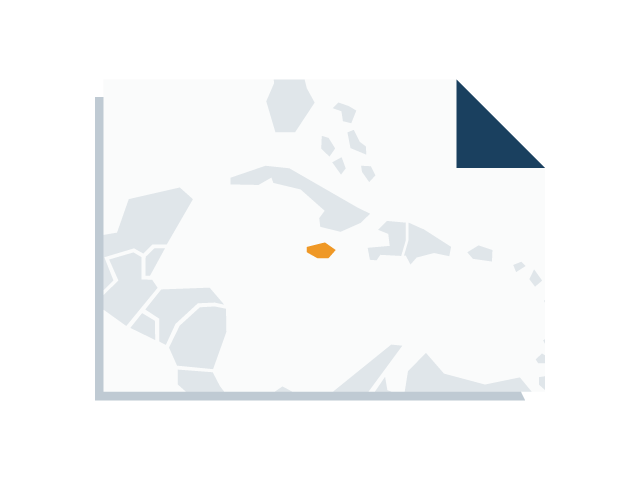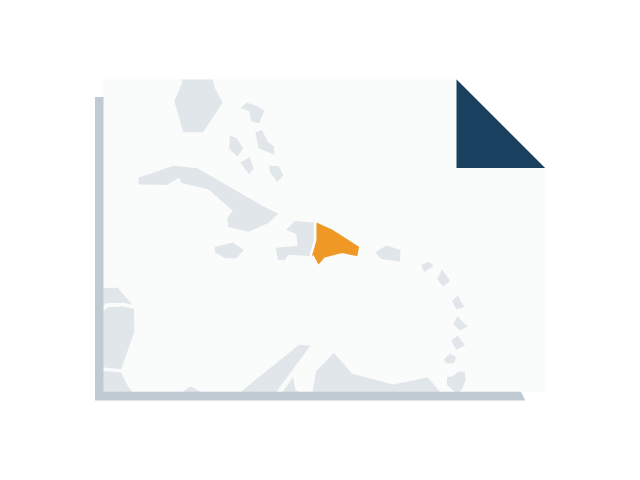AVERAGE SCORE
21READINESS AVERAGE
36IMPLEMENTATION AVG
19IMPACT AVERAGE
14This regional snapshot covers the five Caribbean countries assessed in the fourth edition of the Barometer: Jamaica, Dominican Republic, Trinidad & Tobago, Saint Lucia and Haiti.
General regional highlights and findings
Globally, open data competes for scarce resources and political attention within a crowded policy space, and the effects are felt strongly in this region.
The highest ranking Caribbean country globally is Jamaica at number 40. Climbing 13 places, it was the only country to improve its score since last year’s Barometer (although two out of the five Caribbean countries were new in this edition).
In countries that recently launched open data portals — such as Jamaica and Dominican Republic — the absence of systematic processes to provide consistent updates resulted in incomplete data that quickly became out of date and irrelevant.
Regional Ranking
| Global Rank | Score | Country | Readiness | Implementation | Impact |
|---|---|---|---|---|---|
| 40 | 37 |
 Jamaica
Jamaica
|
44 | 35 | 36 |
| 50NEW | 32 |
 Dominican Republic
Dominican Republic
|
45 | 32 | 22 |
| 77NEW | 18 |
 Trinidad and Tobago
Trinidad and Tobago
|
38 | 12 | 13 |
| 87 | 13 |
 Saint Lucia
Saint Lucia
|
33 | 10 | 0 |
| 104 | 6 |
 Haiti
Haiti
|
19 | 6 | 0 |
Open Data Barometer 4th edition - Regional ranking
How’s the region performing against the rest of the world?
Readiness
There is pent up demand from businesses and entrepreneurs to take advantage of the economic opportunities offered by open data.
Governments in the region have yet to commit to developing the initiatives and policies needed to support demand-side opportunities.
Initiatives are not yet reaching the subnational level.
Implementation
Open data portals have been launched in two leading Caribbean countries — Jamaica and Dominican Republic. Haiti is the first country in the region to release budget data, through the BOOST initiative.
The availability of data remains limited, particularly for datasets that enable government accountability. There is an absence of systematic processes and mechanisms to provide consistent updates, limiting the quality and effectiveness of government data that is available.
Impact
Even with the very limited data currently available, the first signs of impact are emerging. For example, economic and social opportunities have been identified by a scoping study for the tourism sector.
While impact is very limited in general, it is confined to economic impact. Social impact is not yet evident.
Country Profiles

Jamaica improved its position, climbing 13th places to 40 in the global ranking. It remains the open data leader among Caribbean countries, and rose to 7th in the Latin America and the Caribbean category. The national open data agenda has benefited from the launch of the Open Government Data portal and the hosting of the fifth annual Developing the Caribbean Conference, which brought together technologists, researchers and entrepreneurs to use data to solve some of the region’s biggest challenges. The Barometer assessment showed Jamaica has extensive demand-side opportunities, and the capacity to realise considerable social and economic value from open data.

The Dominican Republic enters the Barometer ranking for the first time at position 50 globally, and 2nd in the Caribbean. Compared to neighbouring countries, the government shows a strong commitment to advancing open data policy and action. It was the first Caribbean country to join the Open Government Partnership, and the first to have an active open data portal, launched in 2015. The NORTIC data publication and management guidelines, launched in 2013, set standards for the transformation of data into reusable information.

